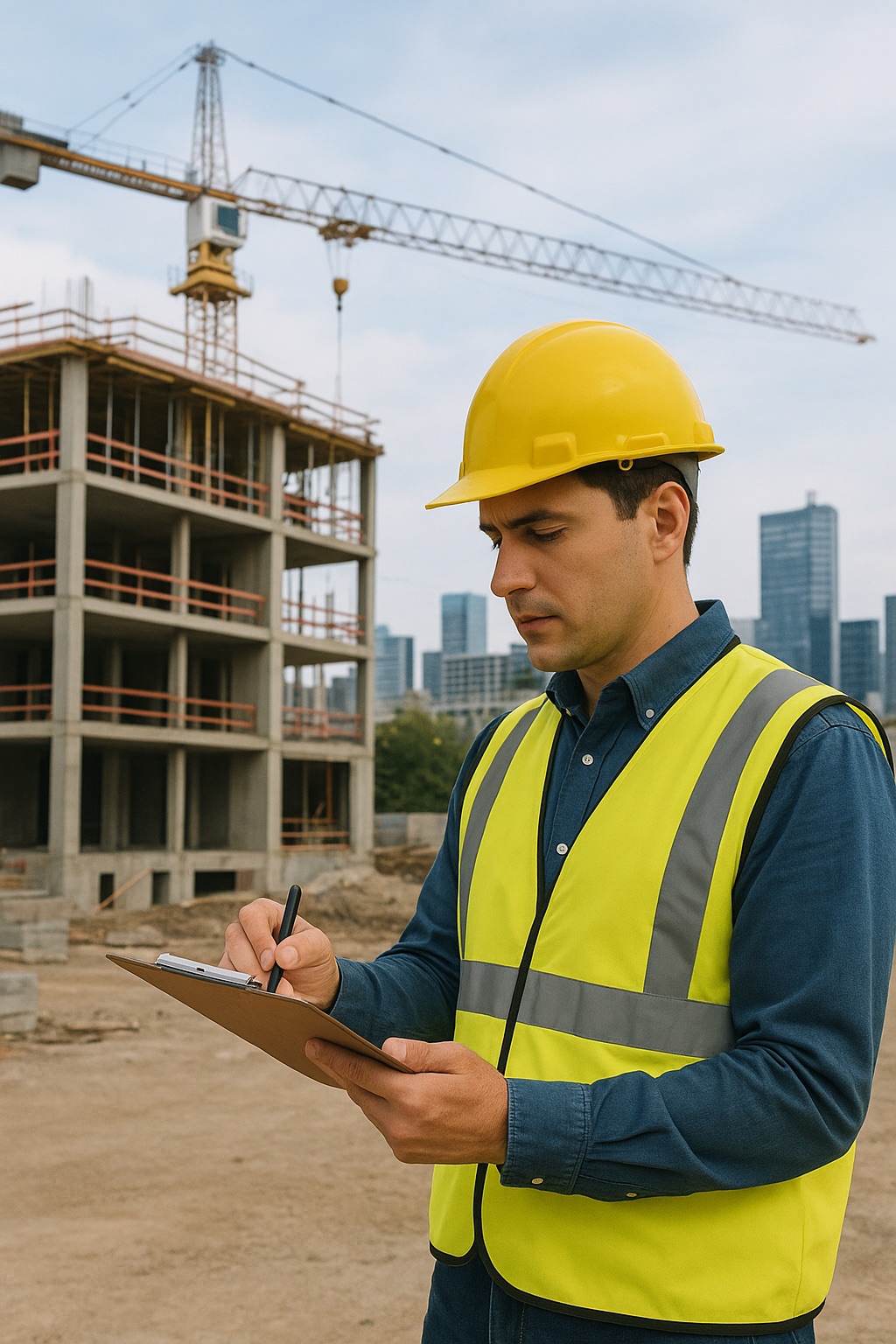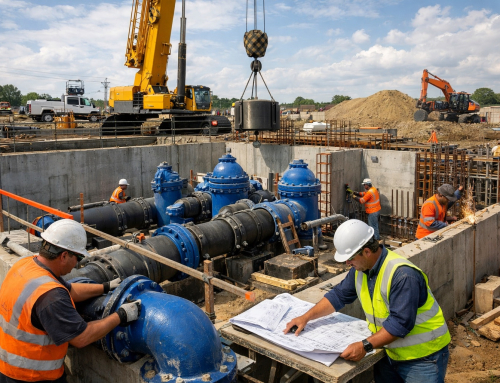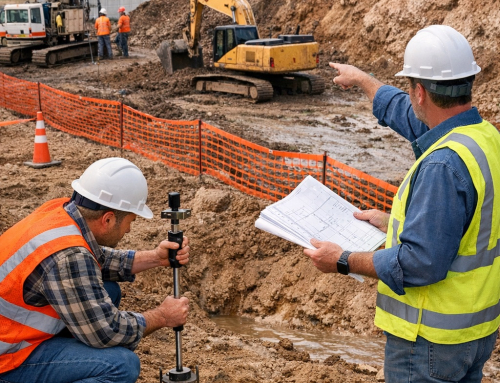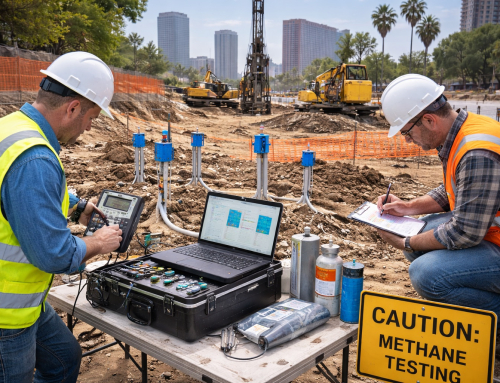Construction in Los Angeles is strict. The city has complex codes. Safety is the top priority.
Every project must pass inspections. Without them, work cannot continue. They are more than a box to check. They protect people and property. They reduce risks. They prevent accidents.
Deputy Inspectors are central to this system. LADBS requires them on many projects. They provide independent checks. They make sure no step is skipped.
This guide explains deputy inspections. It shows when they are needed. It covers codes, duties, and steps. It also lists mistakes to avoid. Knowing this process saves time and money. Knowing it avoids stress.
Deputy inspections are not optional. They are required by law. They are part of the permit process. They are tied to approvals.
What Are LA City Deputy Inspections?
Deputy inspections are special checks. They focus on safety and structure. They focus on details.
Deputy Inspectors are not city staff. They are private but certified by LADBS. Only those on the roster may inspect. Only approved names count.
Their role is to confirm compliance. They watch critical work. Concrete, steel, and soil are main areas. They watch every move.
They are independent of the contractor. Their loyalty is to LADBS. This ensures honesty. This ensures fairness.
Deputy inspections are required on complex jobs. They add a second line of defense. They keep unsafe work out of Los Angeles. They keep weak work from being hidden.
They are trusted because they are trained. They are trusted because they are monitored. LADBS audits them often. Oversight never stops.
When Are Deputy Inspections Required?
Inspections are not for all jobs. Simple projects may skip them. Large or structural projects cannot. But here are some key situations, when we certainly need them, such as:
- Reinforced concrete requires checks. Rebar must be correct before concrete pours. Mix design must match plans. Placement must be exact.
- Steel welding also needs oversight. Each weld must meet strength codes. Bolted connections are checked for tightness. Every joint is inspected.
- Shotcrete and grout placement are inspected too. Masonry walls must meet design standards. Walls must not shift.
- Pile foundations are a major trigger. Depth and size must match drawings. Soil compaction must also be tested. Testing is strict.
Moreover, the permit package states all needs. The “Special Inspection Note Sheet” is the key. It tells the owner which inspections are mandatory. It acts as a checklist.
If inspections are skipped, there would be serious consequences. For example, LADBS may stop the job. Even work can be ordered to be removed and it costs time and money. Similarly, halting the project can stop deadlines.
The right inspections prevent structural and foundational integrity issues. Properly framed inspections safeguard schedules, jobs and project budgets.
Responsibilities of a Deputy Inspector
Generally, deputy Inspectors have strict duties. They check materials, procedures, and work. Moreover, they maintain the inspection record with proofs. We can have detailed job responsibilities such as:
- They log daily activities. Every entry shows what was done. These logs become official records. They cannot be erased.
- If work is wrong, they stop it. They must notify LADBS. They cannot hide mistakes. They must act fast.
- At project end, they sign a final report. LADBS uses it for approval. Without it, projects cannot close. Without it, permits stay open.
- Deputies answer to LADBS. They may be paid by owners. But their duty is to the code. That keeps the system fair.
Inspectors must also stay impartial. They cannot accept gifts. They cannot accept pressure. They cannot take shortcuts.
Read more to find out Why Every natural disaster, flood, or fire, requires structural and foundational testing to ensure stability.
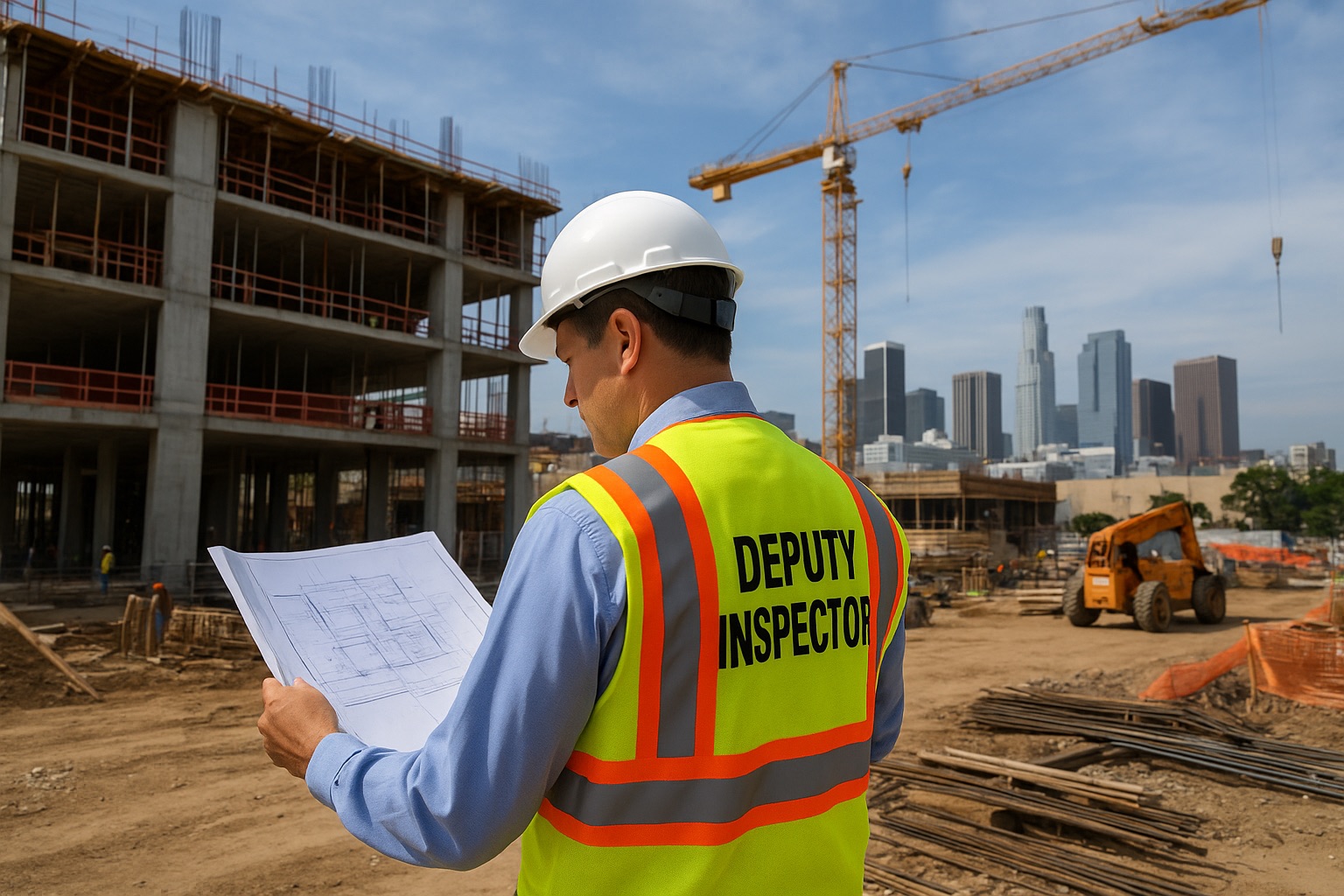
Deputy Inspector reviewing blueprints at a Los Angeles construction site to verify compliance with LADBS codes and safety standards.
LADBS Deputy Inspector Certification Process
In Los Angeles, Certification for construction inspectors is controlled by LADBS. For the approval of inspectors, the applicants must prove skill. If they have “No skill”, there would be “no approval”. Here is the complete procedure for choosing a construction inspector.
- First, the candidate will apply. Then they face exams.
- There are two exams for the certification. One is written and one is practical. Both must be passed.
- As construction has vast specialties and each specialty has its own test. Concrete, masonry, soils, and welding are main areas. Each field is separate and unique.
- Passing one test allows work in that field. More tests mean more specialties. More specialties mean more work.
- LADBS issues certification for a specific duration. The certification expires and after that renewal is required. To avoid problems, inspectors must stay updated. They must stay sharp for their certification updates.
- They also attend the regular trainings etc. some of them can be continuing education. Codes change often, so learning never stops. Training is constant.
Only inspectors on the LADBS roster are valid. Anyone not listed cannot inspect. Their reports are void.
This process ensures quality. It ensures trust. It ensures consistency. It ensures safety.
Key Local Codes and Safety Standards to Know
Codes and standards are the foundation for all the construction inspectors. They use it as guidelines to evaluate the construction process, and materials.
- The California Building Code is the base for construction inspection.
- Moreover, Los Angeles adds local amendments according to regional requirements. These reflect city needs. Earthquake safety is one example. Fire safety is another.
- IBC Chapter 17 also applies. It sets rules for special inspections. It is a key reference.
- LADBS checklists guide daily work. They ensure uniform results. They reduce confusion.
- Safety is another rule set. OSHA is the standard. LA also has city safety rules. Excavation and demolition need strict steps. Workers must follow them.
Inspectors must know them all. Contractors must too. Knowledge keeps projects moving. Knowledge avoids penalties.
Codes are living documents. They are updated often. Teams must check for changes. They must review updates.
What Does a Typical Deputy Inspection Involve?
A normal day for a construction inspector involves the following schedule.
- The day starts with reviewing plans. The inspector checks notes and permits. They prepare first.
- Next, they walk the site. They confirm details. They look closely.
- For concrete, rebar is checked. Spacing, size, and placement are verified. The inspector watches the pour. They take samples for cylinder tests. They run a slump test too. They take photos.
- For welding, they watch the process. They confirm welder qualifications. They inspect finished welds. They look for cracks.
- For bolting, torque checks are done. High-strength bolts must meet spec. Loose bolts are flagged.
- Soil work is monitored. Compaction tests are done with special tools. Pile drilling is checked for depth. Reports are logged.
- All results go into the log. No work may be covered before approval. Nothing can be hidden.
- The day ends with signatures. Reports are sent to LADBS. Records are stored.
Sometimes, multiple inspections happen in one day. Large jobs may need constant presence. Inspectors may stay on site for weeks. They may even stay full-time.
Common Mistakes to Avoid on LA Projects
As construction in Los Angeles is quite complex and critical. It is advisable to ensure the best practices throughout the project. Some of the common mistakes are as below:
- Failing to hire early is a top error. Deputy Inspectors must be ready before special work. Waiting causes delay.
- Scheduling late is another issue. Inspectors must check before concrete pours. After pouring, it is too late. The work may be rejected.
- Using unapproved materials is common. Inspectors must confirm brands and specs. Substitutions without approval cause delays. They cause rework.
- Logs are often missing. Daily reports must be complete. Incomplete records stop approvals. Missing logs mean failed inspections.
- Lack of communication adds problems. Teams must talk to inspectors daily. Silence causes mistakes.
- Another mistake is assuming small jobs are exempt. Some minor work still needs checks. Always confirm with LADBS. Always verify.
Tips for Smooth Compliance and Coordination
For a smooth coordination and fully compliance with the standards, you must:
- Plan your project early. Do not wait. Hire a certified Deputy Inspector before work.
- Check all the credentials. Confirm they are on the LADBS roster. Never trust without checking.
- Keep plans and test results on site. Digital and paper copies help. Backup is important.
- Know the inspection scope. Ask LADBS if unsure. Clarity always prevents mistakes.
- Train all the workers at site. They must know how to work with inspectors. Training avoids conflict.
- Fix problems fast. If you get a non-conformance report, act. Document the fix. Show LADBS proof. Keep records.
- Strong teamwork prevents delay. Projects move faster. Projects stay safe.
- Hold weekly coordination meetings. Invite the inspector. Review upcoming work. Review potential risks.
- Respect the role of construction inspectors. Treat them as partners. Trust builds smoother projects. Respect builds cooperation.
Hiring experts for compliance
Require good geotechnical or environmental studies? Marshall GeoScience provides consulting solutions in the fields of soil, rock, and ground water. We are making sure that all of your project requirements are safe and comprehensive. Our team will assist you with site reviews, or lab work.
Contact Us Today. All you need to do is helps us to establish a strong base of your project.
Key Takeaways
Deputy inspections protect Los Angeles homes, buildings, and safety. They ensure code and safety. They are vital for approval. They are vital for people. They give confidence to owners. They give assurance to the public. They are at the core of Los Angeles building safety.
Hire early. Keep records. Communicate well. Stay organized. Stay proactive. Stay prepared for reviews. Meeting deputy inspector requirements avoids delays. Follow local codes and city rules. LADBS inspections set the standard for compliance.
In Los Angeles, they are part of every major build. They cannot be ignored. They cannot be replaced. They cannot be bypassed. They stand as the final safeguard. They are the backbone of safe construction.
Build with knowledge. Build with confidence. Build smart from the ground up.


